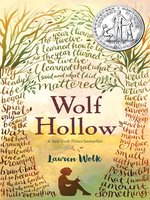
Newbery Winners for 2017
This year’s Newbery Winners seem to have a common theme. In general,
the winners of this award can be all over the place with books of different
genres and formats. And this year is no exception. A poetic picture book, a
fantasy with witches and swamp monsters, another fantasy based on medieval
France and a novel of historical fiction seem to have little in common. Yet,
they all focus on oppression and in three of the books, the focus is on how
children can work to overcome oppression. In fact, only in the magical fantasy
book do the children have adult models of how to work against oppression.
Did these four books with these themes of oppression in
common just happen to be published in this year? Did the Newbery committee
choose these books because of the theme and what is happening politically in
our country? Or is it all just a coincidence? It’s hard to say. But, either
way, we have four beautifully written stories to share with all the children in
our classrooms. And we can help them see the models in these books as a way to fight
oppression in our own age.
Another thing these books have in common is that they are
all fantastic, which is what you would expect of Newbery winners. Yet, they are
all fantastic in different ways. In The
Girl Who Drank the Moon by Kelly Barnhill, a small village sits on the edge
of a forest waiting in dread for the Day of Sacrifice which comes every year.
The youngest baby is taken by the elders and left in the forest as a way to
appease the evil spirits within. Yet, it turns out the evil spirits are those
within the village and each year Xan, the good witch, takes the baby that is
left as a sacrifice and finds a home for it. She often puzzles over the
practice of leaving a baby to die at the hands of the beasts that roam the
woods, but she does not hesitate to save the baby. On the year that Luna is
born, Xan accidentally feeds her from moonlight rather than starlight and this
sets in motion the beginning of the end, a tale that runs out when Luna is just
shy of her 13th birthday. Barnhill writes of a magical world with
good and evil clearly separated and manages to depict within this world the
evils of greed, selfishness and government that oppresses the poor and poorly
educated. All this, and she tells a story that spins tighter and tighter as the
days tick down to what could be the end of this world.

Wolf Hollow by
Lauren Wolk gives us a story set in rural Pennsylvania during World War II.
Annabelle’s family is not rich, but they are well-off and comfortable within
their community. They are also kind and compassionate toward Toby, a WWI
soldier who suffers from shellshock, who camps out in an old mill on their
property. Wolk weaves a story of bullying, discrimination against both Toby,
who is disabled, and the local German peddler; and self-determination on the
part of Annabelle, who must make some difficult decisions about how and when to
judge others. Many have compared this story to To Kill a Mockingbird and while this is a positive comparison, I
feel that it stands on its own because of the strong character development and
the integrity of its themes.

Another magical tale was written by Adam Gitwitz, The Inquisitor’s Tale: Or, The Three
Magical Children and Their Holy Dog, but he bases this story on realistic
events of persecution of the Jews in medieval France. The three children,
Jeanne, William and Jacob all have some magical powers and they all stand up
for the rights of others. In the climax of the story, the three children risk
their lives to save the life of the Queen mother who has foolishly ridden her
horse into a sea of quicksand. Queen Blanche, a character based in history, has
spent her life persecuting Jews (Jacob), peasants (Jeanne) and
Saracens/Africans (William), yet these children cannot stop themselves when she
is drowning. A touching tale, told from many different perspectives, gives
children and adults words to talk about persecution and oppression.

Finally,
Ashley Bryan has written and illustrated Freedom
over Me: Eleven Slaves, Their Lives and Dreams Brought to Life by Ashley Bryan.
This short picture book includes poems and drawings depicting the lives of
11 slaves who were sold at auction in 1828. The slaves’ narratives both brief
descriptions of their lives and dreams they have for better (non-bondaged)
lives are each accompanied by colorful depictions of their faces and their visions.
Bryan has researched to present these slaves in a realistic way, not glorifying
slavery, yet honoring those who found themselves oppressed by their fellow man.
A great tool to show children a part of our history that we must not forget.